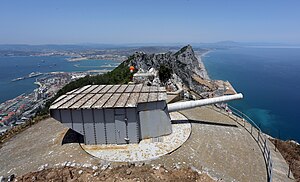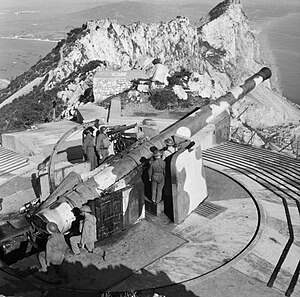Breakneck Battery
| Breakneck Battery | |
|---|---|
| Part of Fortifications of Gibraltar | |
| Upper Rock Nature Reserve, Gibraltar | |

Breakneck Battery's 9.2-inch Mark X coastal gun in 2013
|
|

Breakneck Battery, with a 9.2-inch Mark X coastal gun on a Mark V mounting, 4 January 1942
|
|
| Coordinates | 36°07′42″N 5°20′39″W / 36.128373°N 5.344253°W |
| Type | Artillery Battery |
| Site information | |
| Owner | Ministry of Defence |
| Open to the public |
no |
| Site history | |
| Built | Between 1890 and 1914 |
Breakneck Battery is an artillery battery in the British Overseas Territory of Gibraltar. It is located on Ministry of Defence property at the Upper Rock Nature Reserve, north of Lord Airey's Battery. It is one of a dozen batteries in Gibraltar that had 9.2-inch (233.7 mm) guns installed around the turn of the twentieth century. The emplacement features a 9.2-inch Mark X breech-loading gun on a Mark V mounting. The battery was refurbished by a visiting regiment in 2012, and is one of three surviving 9.2-inch gun emplacements at the Upper Ridge of the Rock of Gibraltar. By the late twentieth century, the 9.2-inch guns in Gibraltar, Bermuda (also known affectionately as "the Rock", and the former site of a Royal Naval Dockyard, and once considered "the Gibraltar of the West"), Portugal, South Africa, and Australia were the remaining examples of an emplacement that at one point had been mounted at strategic locations across the British Empire.
Breakneck Battery is in Gibraltar, the British Overseas Territory at the southern end of the Iberian Peninsula. The artillery battery is located at the Upper Ridge of the Upper Rock Nature Reserve, on Ministry of Defence property. It is positioned north of Lord Airey's Battery on a site once known as Mount Misery, which was renamed in 1901. The name "Breakneck" was inspired by the nearby Breakneck Stairs which descend part way down the sheer cliff on which the battery stands, overlooking the Mediterranean Sea.
The decision to mount 9.2-inch breech-loading guns on the emplacements in Gibraltar can be traced back to the explosion of one of the 38-ton, muzzle-loading guns on HMS Thunderer (1872). After that explosion on 2 January 1879, a Committee on Ordnance was founded to analyze the United Kingdom's artillery and the direction that it would take. The committee was directed to address "the question of breech-loading guns and such other questions as may be brought before it."
...
Wikipedia

